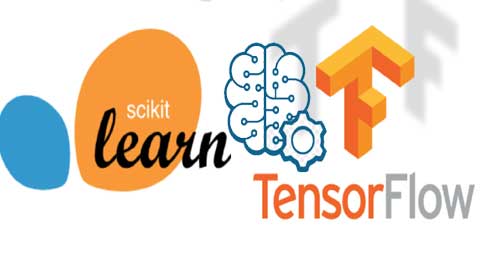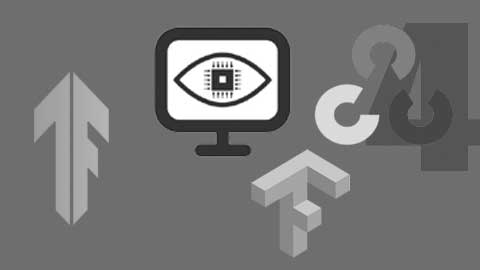What you'll get
- Job Credibility
- Certification Valid for Life
- Live Classes
- Certificate of Completion
Exam details
- Mode of Exam : Online
- Duration : 1 Hour
- Multiple Choice Questions are asked
- No. of Questions are asked : 50
- Passing Marks : 25 (50%)
- There is no negative marking
TensorFlow is open source and the most popular deep learning framework that available nowadays. In Certificate in Deep Learning with TensorFlow 2, we will teach you applied machine learning skills with TensorFlow. You will learn essential AI-powered applications with TensorFlow. After finishing this program you will be able to apply for a wide range of possibilities such as solving problems and tasks.
In this course, you will master in building and training neural networks, improving networks performance. Also, error function, teaching machine and understanding, text processing and many deep concepts.
This course will help you to work with TensorFlow to implement those principles to build up scalable models to real-world performance. To develop a deeper understanding of neural work.
About career with TensorFlow 2.0
This Deep learning library, TensorFlow is widely used by companies for deep learning and managed by google. If you think about career prospectus in TensorFlow then you should know that Data Scientists are paid up to $100000 per year. This information is available at Glassdoor, you can check it.
The reason for doing this course
This specialization program is carrying short modules with comprehensive tutorials, Writing codes in this library is easier. And its widely used by the many companies like Nvidia, eBay, Intel, Airbnb and more.
Course Content
-
What is TensorFlow (TF)?
-
What are the most important changes in TensorFlow 2.0?
-
Introduction to neural networks
-
Perceptron
-
Multi-layer perceptron – our first example of a network
-
A real example – recognizing handwritten digits
-
Regularization
-
Playing with Google Colab – CPUs, GPUs, and TPUs
-
Sentiment analysis
-
Hyperparameter tuning and AutoML
-
Predicting output
-
A practical overview of backpropagation
-
What have we learned so far?
-
Towards a deep learning approach
-
Understanding TensorFlow 1.x
-
Understanding TensorFlow 2.x
-
The TensorFlow 2.x ecosystem
-
What is regression?
-
Prediction using linear regression
-
TensorFlow Estimators
-
Predicting house price using linear regression
-
Classification tasks and decision boundaries
-
Deep Convolutional Neural Network (DCNN)
-
An example of DCNN ‒ LeNet
-
Recognizing CIFAR-10 images with deep learning
-
Very deep convolutional networks for large-scale image recognition
-
Computer vision
-
Video
-
Textual documents
-
Audio and music
-
A summary of convolution operations
-
Capsule networks
-
What is a GAN?
-
Deep convolutional GAN (DCGAN)
-
Some interesting GAN architectures
-
Cool applications of GANs
-
CycleGAN in TensorFlow 2.0
-
Word embedding ‒ origins and fundamentals
-
Distributed representations
-
Static embeddings
-
Creating your own embedding using gensim
-
Exploring the embedding space with gensim
-
Using word embeddings for spam detection
-
Neural embeddings – not just for words
-
Character and subword embeddings
-
Dynamic embeddings
-
Sentence and paragraph embeddings
-
Language model-based embeddings
-
The basic RNN cell
-
RNN cell variants
-
RNN variants
-
RNN topologies
-
Encoder-Decoder architecture – seq2seq
-
Attention mechanism
-
Transformer architecture
-
Introduction to autoencoders
-
Vanilla autoencoders
-
Sparse autoencoder
-
Denoising autoencoders
-
Stacked autoencoder
-
Principal component analysis
-
Self-organizing maps
-
Restricted Boltzmann machines
-
Variational Autoencoders
-
Introduction
-
Introduction to OpenAI Gym
-
Deep Q-Networks
-
Deep deterministic policy gradient
-
Deep learning on cloud
-
Virtual machines on cloud
-
Jupyter Notebooks on cloud
-
TensorFlow Extended for production
-
TensorFlow Enterprise
-
TensorFlow Mobile
-
TensorFlow Lite
-
Pretrained models in TensorFlow Lite
-
An overview of federated learning at the edge
-
TensorFlow.js
-
What is AutoML?
-
Achieving AutoML
-
Automatic data preparation
-
Automatic feature engineering
-
Automatic model generation
-
Google Cloud AutoML
-
Bringing Google AutoML to Kaggle
-
History
-
Some mathematical tools
-
Activation functions
-
Backpropagation
-
Thinking about backpropagation and convnets
-
Thinking about backpropagation and RNNs
-
A note on TensorFlow and automatic differentiation
-
C/G/T processing units
-
Three generations of TPUs and Edge TPU
-
TPU performance
-
How to use TPUs with Colab
-
Using pretrained TPU models
-
Using TensorFlow 2.1 and nightly build


